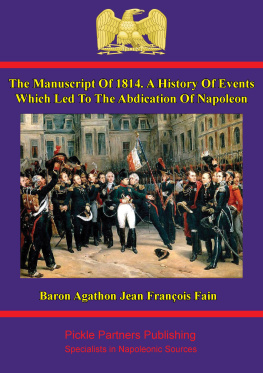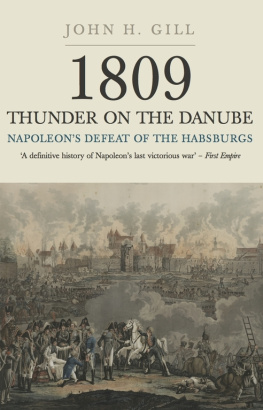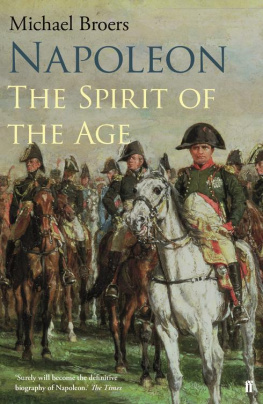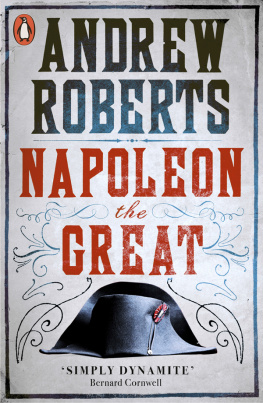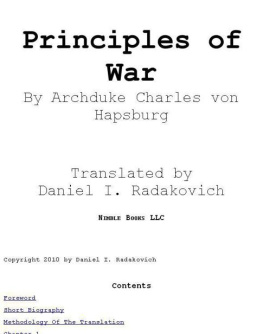Gunther Rothenberg was the worlds leading authority on the Napoleonic Wars. He served with the British, Israeli and US Military, was Professor of History at Purdue University in the US and was also the leading English-speaking historian of warfare in the German-speaking lands. His many distinguished works include The Army of Francis Joseph, The Hapsburg Military Frontier and The Napoleonic Wars.
THE
EMPERORS
LAST VICTORY
NAPOLEON AND THE BATTLE OF WAGRAM
Gunther E. Rothenberg
CASSELL
Contents
The Emperors Last Victory does fitting justice to what is increasingly recognized as a fundamental turning point in the wars of 17921815, when Napoleon, although indeed victorious, encountered an army which was not only singularly persistent, but the first to bring divisions and corps into battle in a way which had been a monopoly of the French. The present study is a work of impeccable formal scholarship, as will be recognized by its supporting apparatus of references; it is also the product of a life and of sympathies which were as varied as any to be found in the authors generation.
Gunther Rothenbergs own experience of contrasting active service and contrasting military cultures was crucial to his formation as a military historian. He knew that both the fighting and what lay behind the fighting deserved serious consideration, and he had learned that military operations did not lend themselves to formulae: you just do the best you can with the forces at hand.
His list of published works, his talk and his travels show him to have been a man thoroughly at home in the wider culture of central and eastern Europe, and more specifically the former territories of the Habsburg Empire. Indeed he was once described as the Emperor Franz Josephs most loyal subject. He set himself against history as an exercise in nostalgia, yet there is affection as well as understanding in what he could write of the cities and little towns where still stands the barracks painted in the characteristic Habsburg faded yellow.
Gunther was an enemy of academic careerism and bureaucracy, and he wrote in a clear and elegant English which is not always to be found among other professional historians on either side of the Atlantic. He was on the editorial board of the leading British historical journal, War in History, and lived to see military history accepted into the mainstream of British academic life. He was a frequent contributor to its transatlantic counterpart, the Journal of Military History, and his achievement remains a standing reproach to those circles which have sought to deny military history comparable status in America.
It is fair to adapt and apply to Gunther Rothenberg some phrases which are to be found in The Army of Francis Joseph, his favourite among his own writings: he carried out his mission, did his duty, and remained faithful.
Christopher Duffy
London, June 2004
WAGRAM IN HISTORY
Other than the Battle of the Nations of October 1813, the Battle of Wagram, fought on 56 July 1809, was the largest engagement of the Napoleonic Wars, indeed of the early nineteenth century. Along a front of 14 miles, 300,000 French and Austrian troops supported by almost 1,500 guns clashed for two days. Combined casualties reached 72,000. If perhaps not as brilliant a victory as Austerlitz four years earlier the Austrian army retired in good order and still combat capable it was none the less a decisive victory for the French, the last Napoleonic victory to break the enemys will to continue fighting.
As so often during these wars, promised British support was too little and much too late. None the less, Britain profited from the campaign of 1809 after Napoleon had been compelled to leave Spain hurriedly to take command in Germany. Had he been able to remain on the Peninsula, it is probable the campaign in Spain would have turned out very differently. The emperor might well have broken Spanish resistance and driven Wellington into the sea. Further, had he been able to transfer to central Europe the close-on 300,000 troops he was forced to keep in Spain, it may well have made the difference between victory and defeat in the Russian campaign of 1812.
The 1809 campaign has been called not just a turning point of the Napoleonic Wars but of warfare in general. Robert Epstein has described it as demonstrating the revival of symmetry in European warfare, with the recent introduction of a corps system in the Habsburg Army narrowing, if not eliminating, the gap between the French and Austrians. In turn, this reduced Napoleons capacity to deliver a decisive stroke and turned Wagram, the climactic battle of the campaign, into a two-day attritional engagement, foreshadowing the emergence of modern war. That said, the degree to which the Austrians had fully absorbed French operational methods by 1809, especially staff organization, remains in doubt.
James R. Arnold, on the other hand, has judged that the principal importance of the campaign was tactical. For him, the decisive factors were the increased weight of artillery fire at Wagram the artillery of each side fired approximately 95,000 rounds and the decrease in the effectiveness of battle cavalry, even if it was still useful in screening off breakthroughs and covering withdrawals. Epstein also disputes the notion that the quality of Napoleonic infantry had declined by 1809, and here their grim stand against great odds in an earlier battle of the campaign, at AspernEssling, must be added to their performance at Wagram. On both occasions the French and their allied troops alike fought extremely well, the German Confederation of the Rhine forces apparently immune to Austrian appeals to German nationalism.
These arguments, of course, are not mutually contradictory and with some reservations I accept both. There can be little doubt, for example, that Wagram was a forerunner of the operational and tactical developments of the American Civil War and, with modifications, of the Prussian victories in the wars of German unification. However, I place greater emphasis on the personalities and the generalship of the commanders on the two sides. I accept that as head of state and supreme commander Napoleon enjoyed greater flexibility while the Austrian commander, Archduke Charles, was often hampered by the ambivalence and mistrust of his elder brother, the Emperor Francis I, as well as by the interests of the senior officers and military bureaucracy. But Wagram was not simply a case of the Austrians losing the battle: Napoleon definitely won it. At Wagram, Napoleons genius, his ability to combine detail in his preparations and then his superb battle handling of his corps, themselves led by enterprising commanders, was decisive. On the other hand, while a capable general, Archduke Charles lacked the hunger for victory. He did not use the weeks before the battle to good purpose and he was hesitant and slow in command, a style mirrored by his chief subordinates. As both in earlier and in later wars, with roughly equal numbers and quality of troops, generalship and leadership remained the decisive elements contributing to victory.
A NOTE ON RANKS AND NAMES
The highest rank in the Austrian Army in 1809 was generalissimus (or generalissimo), an ancient title resurrected specifically for Archduke Charles. Otherwise the highest rank was feldmarschall (FM), followed by feldmarschalleutnant, abbreviated as FML, or general der cavallerie (GdC). Below this was general major (GM) or major general, usually the commander of a brigade.
In the French Army the highest rank was marshal, actually an aristocratic title rather than just a military rank, followed by gnral de division (GD). Both ranks commanded corps, though the generals could also command smaller formations. The lowest general officer was gnral de brigade (GB). The Confederation of the Rhine ranks were similar with a general leutnant (GL) the equal of a gnral de division and brigade general (BG) the equivalent of its French counterpart.
Next page

